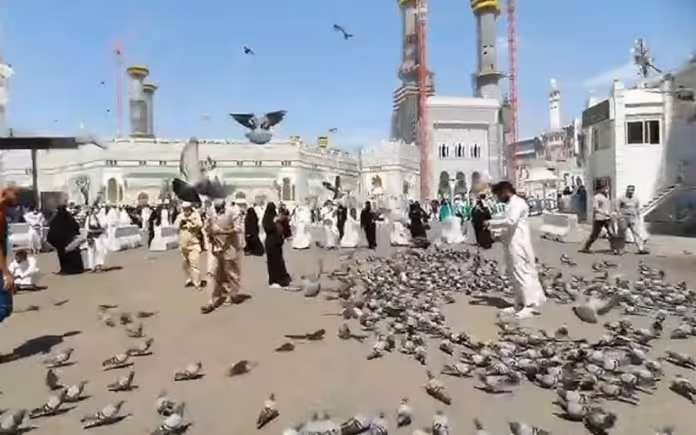A Sacred Step Toward Cleanliness and Safety – Saudi Arabia bans on feeding pigeons in Makkah and Madinah
In a move reflecting both reverence and responsibility, Saudi authorities have announced a ban on feeding pigeons near Masjid al-Haram in Makkah and Masjid al-Nabawi in Madinah. This initiative aims to preserve the cleanliness of Islam’s two holiest mosques and ensure public health for the millions of worshippers who visit these sites every year.
For decades, feeding pigeons in the courtyards and surrounding streets of these sacred cities has been a common sight—often seen as an act of kindness or charity. However, the new directive seeks to address the unintended consequences of this seemingly innocent practice, aligning with broader efforts to maintain hygiene and protect the spiritual atmosphere of these holy places.

Why the Ban Was Necessary
Authorities cited growing concerns about public health, sanitation, and pest control as primary reasons for the decision. Pigeons, though symbolic of peace, can also carry diseases and contribute to the accumulation of droppings that pose serious hygiene issues, especially in densely crowded areas.
The constant congregation of birds around the mosques often leads to the soiling of walkways, walls, and open spaces, making it challenging to maintain cleanliness standards. With millions of pilgrims visiting year-round, even small lapses in hygiene can quickly escalate into major concerns.
By curbing pigeon feeding, the Saudi government aims to minimize potential health hazards, prevent bird overpopulation in sacred zones, and uphold the purity and sanctity expected in these revered locations.
A Broader Vision for Pilgrim Welfare
This decision is part of a comprehensive initiative by the Saudi authorities to enhance the experience of pilgrims and residents in Makkah and Madinah. Over the past few years, the Kingdom has undertaken several measures—from advanced waste management systems to strict health protocols—to ensure that every visitor performs their religious duties in an environment that is both safe and spiritually uplifting.
Officials have emphasized that maintaining the cleanliness of Masjid al-Haram and Masjid al-Nabawi is not just a matter of aesthetics but an act of respect for the sanctity of these sacred spaces. Ensuring a pure environment aligns with Islamic teachings that emphasize cleanliness as a vital part of faith.
Public Awareness and Implementation
Local authorities have begun public awareness campaigns to educate residents and pilgrims about the reasons behind the ban. Signs have been placed in affected areas, and security teams have been tasked with monitoring compliance.
Violations of the ban may lead to penalties, as the Kingdom takes cleanliness in holy areas very seriously. Yet, the focus remains on awareness rather than punishment—encouraging everyone to cooperate for the greater good.
By involving the community and fostering understanding, Saudi officials hope to inspire a sense of shared responsibility among pilgrims and locals alike.
Preserving the Sanctity of the Holy Cities
This move is more than just a policy—it is a reminder of the deep respect and care owed to sacred places. Maintaining cleanliness around Masjid al-Haram and Masjid al-Nabawi is part of honoring the legacy of these sites and ensuring that every worshipper finds them in a state befitting their spiritual significance.
As the Kingdom continues to modernize and enhance its infrastructure for the millions who visit annually, such initiatives underscore a vital balance between tradition, faith, and public welfare.
The ban on feeding pigeons in Makkah and Madinah reflects Saudi Arabia’s unwavering commitment to cleanliness, health, and the preservation of sacredness. It serves as a meaningful reminder that protecting the beauty and purity of these holy cities is a collective duty—one that ensures future generations can continue to experience them in their full divine serenity.
Visit Pakistan Updates for more news and insights on regional and international developments.




